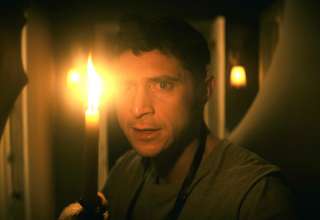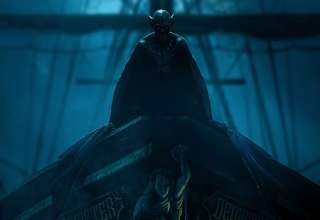A decent amount of what we witness in terms of the story in Victoria is what we as movie fans have seen before. However, it turns into something different when you take a glimpse at how the film as a whole is constructed. From my point of view, this is what makes this German film one to pay attention to. It’s going over some familiar territory, but its artistic approach makes it something to appreciate.
During a late night of partying, a young Spanish woman named Victoria (Laia Costa) meets a group of local Berliners looking for a good time out. They instantly have a connection and make their way through the streets of the closest neighborhoods enjoying their night. All seems well as she hangs around a bunch of wild young men, but Victoria soon finds herself in a precarious position that will result in a dangerous bank robbery.
Victoria succeeds in ways that a good amount of movies fail. Much of what we see here can be described as gimmicky under normal circumstances, but the reason why I hesitate to see it as such in this instance is because it’s done in a way that enhances the film and the overall experience for audiences. In a sense, it’s a fresh take using elements of film that have been around for a while now. That’s what makes it all intriguing, legitimately credible and quite distinguishable.
One of the gimmicks that’s used in Victoria is the long take. What makes it cool here is that the cuts don’t appear to ever show up. Usually you can point out when movies try to hide the cuts, but that’s extremely difficult to do here. From that perspective, this is one of the best ways I’ve ever seen any film anywhere do this. It has me thinking that maybe the claim they’re making of not ever cutting is actually true. If they didn’t, that’s extremely impressive.
As you can see in some of my other reviews, I’m not a guy who ignores that many filmmakers choose to lengthen their films artificially by adding scenes filled with nothing that can be considered important or even useful. This happens far too often, and it looked like Victoria could have fallen into that same trap. This film has a very simple premise to its plot that it doesn’t even approach until it gets like half way through its run time. That alone could steer some people away from it, but this movie represents an exception to that definitive rule of mine.
Watching the characters as we learn about who they are manages to keep your interest. This is usually a tough thing to do in film as we are normally asked to wait for the main events of the plot to take place while nothing is happening that can be considered entertaining. In Victoria, we’re asked to take the time to learn about the personalities of these people while getting to know about their backstories a little bit. This allows you to either like these guys or want to learn more about who they are.
Instead of just allowing the movie to drag along before we get into the story’s main focus, we’re introduced to these characters as people. Unlike certain filmmakers, the creators of Victoria seem to understand that making a good movie this long requires something worth watching. They also know that creating characters that you can take genuine interest in is important for setting things up and for our overall amusement.
While Victoria delivers an ending that’s more predictable than I would have liked, there aren’t too many other negatives that I can attach to it. From a purely artistic standpoint, Victoria gets almost everything right. That’s rare to say these days about most films as they’re frequently tame and without risk since they’re trying to cater to the taste of others. With films like this, that doesn’t appear to matter all that much. To me, this is what art is truly about.
Rating: R
Director: Sebastian Schipper
Cast:
Laia Costa
Frederick Lau
Franz Rogowski
Burak Yigit
Max Mauff
Film Length: 138 minutes
Release Date: October 23, 2015
Distributor: Adopt Films
Country: Germany





















